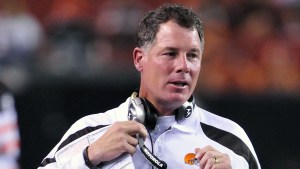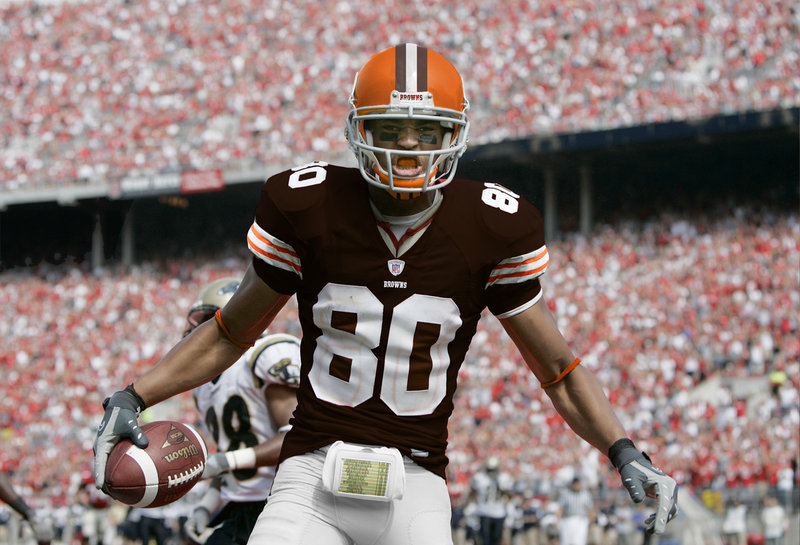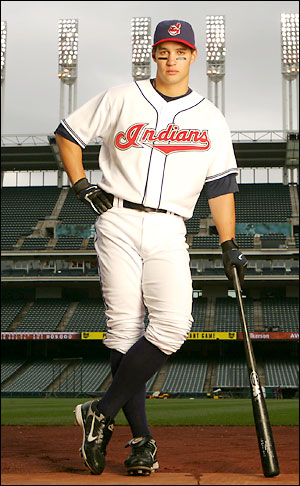 Since it's rare (it's happened once) for a NFL team to go undefeated and win it all, it's fascinating at times to gauge fan reactions to individual losses. There are always reactions as if no game should ever have been lost. There are players to blame, certainly, but mostly fans blame the coaches.
Since it's rare (it's happened once) for a NFL team to go undefeated and win it all, it's fascinating at times to gauge fan reactions to individual losses. There are always reactions as if no game should ever have been lost. There are players to blame, certainly, but mostly fans blame the coaches.
As an overall approach, that makes sense. The plays that don't get made are, to most thinking, the best evidence of bad coaching. We tend to think, for example, that if a player is wearing a brown and orange uniform, he's just as competent as anyone else wearing a uniform to execute the play that's been called so all things being equal, the coach screwed up.
Of course that can't possibly be true as a decade or so of incompetence in Cleveland can attest. We've had all manner of coaches and techniques and yet the performance has remained amazingly consistently bad. No coach could have won with these players.
The problems being experienced by the Browns at the moment are in many ways the same as those being experienced by the Ohio State offense. New schemes and raw players counsel patience. There's just no substitute for the passage of time and all the repetitions that brings. Bitch all you want about Colt McCoy but if you've ever listened to the Beatles live in Hamburg recordings, you can get a better sense that development just takes time.
But that's not to suggest that coaching hasn't played a role in what's transpired to date. It has, in both a good and bad way.
Pat Shurmur, like Colt McCoy, is new to this gig. He's spent plenty of time prepping for his opportunity but heavy does lay the crown once you're given it to wear.
Evaluating McCoy to this point is all about what you want to make of it but it's far easier to do then evaluating Shurmur. We know the record, 3-4, but how much of that is really due to coaching? That is far harder to discern.
Since Shurmur serves as his own offensive coordinator you can certainly look at that aspect of his performance and make some conclusions. The reason Shurmur needs an offensive coordinator has less to do with plays called or schemes designed and has more to do with simply having another voice to bounce ideas off. There's nothing worse then being the only person in the office with your particular expertise. You can talk to others about unique issues but mostly they can just nod in sympathy, clueless as to what the hell you're actually talking about.
So it is with Shurmur, particularly on game days. What's been evident in several games is that his offensive coordinator instincts have overtaken and in some cases inhibited the development of his head coaching instincts. What a particular game may be dictating to an offensive coordinator can be wholly different then what it may be dictating to a head coach who has to balance both sides of the balls.
For example, it probably made sense to the offensive coordinator in Shurmur to have McCoy keep huddling up and slinging the ball in abject futility during several games because he felt like a spark was needed. But to the head coach Shurmur, an even more frenetic approach, such as a no huddle, two-minute drill type tempo early in the game, with the knowledge that if it's not working your defense is mostly good enough might be more appropriate.
But without any healthy discussion during game day except between the left side and right side of Shumur's brain, Shurmur is rendering himself less effective. Thus it wasn't a surprise when team president Mike Holmgren indicated that there would be an offensive coordinator hired next season.
Another area to judge Shurmur is in attention to detail. Whether a new coaching staff or a shortened training camp or both are to blame, the Browns are not nearly as disciplined as they should be. There hasn't been a game yet this season when there haven't been multiple false start penalties on the offensive line. There hasn't been a game this season where there haven't been multiple personal fouls committed. The Browns haven't turned into the Oakland Raiders but they've certainly regressed in this area as compared to the two seasons under Eric Mangini.
These seem like the simplest of fixes and yet it continues to be a nagging problem with this team. Given its lack of overall talent, it's simply not good enough to consistently or even predominately overcome these mistakes. If Shumur wants to placate the fans and take some heat off his team, rapid improvement in this area would be the easiest way. 1st and 10 is challenge enough right now. 1st and 15 might as well be 1st and 50.
Another more difficult area to judge Shurmur is in his use of personnel. He talks often about getting the ball in the hands of playmakers but he still has never adequately answered why he deliberately kept the ball out of Peyton Hillis' hands early in the season. He's likewise devised no gimmicks to get the ball to Josh Cribbs in the open field. As a receiver, Cribbs is very limited. But that shouldn't stop Shurmur from trying to find him other opportunities. You can tell Cribbs is frustrated but he's too polite to take it completely off the reservation.
None of this is to suggest that Shurmur won't make it as a head coach. But too often someone new to the role tries to do too much with it and as a result fails miserably. Even Bill Belichick needed to fail in order to eventually succeed. Yet that's the last thing this organization can withstand.
The Browns aren't poorly coached at the moment but neither is this coaching staff extracting more value out of the team then its talent would otherwise dictate. Patience with Shurmur is just as necessary as it is with McCoy but in truth if Holmgren is going to have any lasting impact on this team it will be to teach Shurmur exactly how to be a head coach.
**
 The Brian Robiskie era, such as it was, is officially over. It's not a surprise. The writing has been on the walls for weeks and in skywriting last Sunday when Jordan Norton came in as the third receiver instead of Robiskie once Mohammed Massaquoi was injured and Greg Little and Cribbs stepped up in grade.
The Brian Robiskie era, such as it was, is officially over. It's not a surprise. The writing has been on the walls for weeks and in skywriting last Sunday when Jordan Norton came in as the third receiver instead of Robiskie once Mohammed Massaquoi was injured and Greg Little and Cribbs stepped up in grade.
I've written about Robiskie before and mentioned how precarious his role on the team really was. A good route runner, he nonetheless had almost no ability to get himself open. His approach was too slow-footed and mechanical to be taken seriously by the defensive backs in the NFL.
My guess is that Robiskie will get a look from one or two other teams and may even stick around for a few more seasons. That will mostly be related to pedigree and draft status. But there's also the not so small fact that if a team as deficient in receivers is nonetheless cutting one, how good could that receiver be? Not very.
Robiskie is the quintessential good guy. He was an excellent college receiver. He's studious and well liked. He won't struggle in a post-football career. There comes a time when, as the coaches like to say, it's time to get on with your life's work. For Robiskie it just came sooner then either he, or Mangini, expected.
**
 Of even higher visibility in the letting go department was the Indians parting ways with Grady Sizemore by not picking up his $9 million option for next season.
Of even higher visibility in the letting go department was the Indians parting ways with Grady Sizemore by not picking up his $9 million option for next season.
The conventional wisdom is that the Indians' small market status figured in the decision but I don't think it really had all that much to do with it. Instead it was Sizemore's agent that drove the decision.
There may have been a few teams in baseball that would have picked up Sizemore's option, but very few. His health issues and his lack of productivity during those periods in between are hardly suggestive of a $9 million/year player and that's true whatever size market your favorite team plays in. The only one not to realize it at the moment is his agent.
According to Chris Antonetti, the Indians' general manager, Sizemore was disappointed because he wanted to remain an Indian. Well, Sizemore could have controlled that by getting better control of his agent who insisted that the contract would not be re-negotiated. That was a mistake because there's usually no team that likes you more and willing to overpay you more then your current one.
Maybe Sizemore's agent thinks a better long-term deal is in the offing from some other team and maybe he's right, but it will be a struggle. I think several teams will make incentive-laden short term offers to Sizemore, with the Indians being one of them. But it will be a shock of major proportions if anyone is willing to give him a guarantee in any contract year of $9 million unless it vests three seasons from now following three seasons of significantly improved numbers.
Sizemore's career has been mercurial, to say the least. It's hard to say how much the injuries really impacted him though obviously they did. Yet his batting eye never really improved all that much. He struck out way too much and that never changed and he didn't walk enough to be an effective leadoff hitter, his preferred spot in the order.
Ultimately, Sizemore has had plenty of time in baseball to live up to the potential he showed but his development stopped, because of injuries mostly but also perhaps because he didn't work hard enough on the gifts he had.
The Sizemore story isn't over yet and perhaps there's still a chapter to be written in Cleveland, but no complaints here about the move the Indians made. We've all seen what a millstone contract can do to a team as Travis Hafner's ridiculous contract continues to inhibit the financial flexibility of the Indians.
**
With the NBA lockout still holding strong and actual games now being missed, no one seems to be in much of a hurry to resolve the dispute. The NBA owners are saving money as the players are being led to slaughter. All this leads to this week's question to ponder: Did NBA players really think there'd be a groundswell of support for their cause?